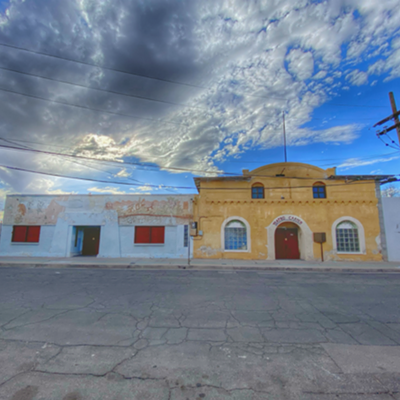The gun-toting ghost of C.J. McElroy must linger in the trophy room bearing his name. For it's here that the California flooring mogul turned big-game stalker deposited his many manly triumphs, from stuffed tigers and huge polar bears to nearly every species of antelope imaginable.
His other legacy buzzes in the back offices of the International Wildlife Museum, this enduring institution he helped found prior to his passing in 2002. From these same grounds, say critics, McElroy's Safari Club International promotes destructive hunting practices under the guise of sportsmanship and crusades to weaken endangered species protections under the pretense of conservation.
And though the Tucson-based club's mission may be global, much of its political work begins right here at home, through extensive ties to the Arizona Department of Game and Fish.
Not only does it sponsor copious department activities, and count an unknown number of Game and Fish commissioners as members, but the club also has the commission marching in lockstep with it on many key issues, from motorized access on public lands to thwarting Endangered Species Act protections.
This snug relationship should come as no surprise, but how many of the five current commissioners are club members remains a mystery; only two responded to my emails posing that question and asking whether they supported the club's endangered species positions.
In a phone call, commissioner Pat Madden of Flagstaff said that he was not a Safari Club member. But another commissioner, Robert Mansell of Winslow, was apparently peeved that I even asked. "I am puzzled why you question my membership, and will not respond to such inquiry," Mansell wrote. "As for my approach to issues coming before the commission, each will be evaluated on an individual basis."
From the remaining commissioners—Kurt Davis of Phoenix, John Harris of Tucson and chairman Jack Husted of Springerville—I received only silence. On the commission's website, Harris was the only member to list a Safari Club affiliation.
Nor did Safari Club executive director Phil DeLone or deputy director Nelson Freeman return phone calls seeking comment.
Ideology aside, the Safari Club "supports the department in a number of ways," writes Game and Fish spokesman Jim Paxon in an email to the Weekly. For instance, the club has donated meals, port-a-potties and volunteer hours to a youth hunting camp in Avra Valley, he writes, and likewise buoys a deer hunt near Arivaca.
Paxon goes on to list a number of collaborative habitat-improvement projects—mostly to benefit game animals—such as the water caches for pronghorn near Sierra Vista. He also points to the department's cooperative efforts with nonhunting groups, such as the Sierra Club, Sky Island Alliance and the Grand Canyon chapter of the Sierra Club.
But Grand Canyon chapter director Sandy Bahr says environmental groups never enjoy the Safari Club's insider status when it comes to commission decision-making, or activities of a Game and Fish Department mostly funded by hunting permit revenues.
"The big-game species generate dollars, and so the trophy hunters—which is what the Safari Club is—are the groups that have some of the most influence. Those are their constituents," Bahr says. "If you read the commission's meeting minutes over the last three years, they really don't consider people who aren't part of those clubs.
"And the commission is not worried about looking like they're in the pocket of a particular group either," Bahr says, "because there's really not much accountability."
That accountability gap is compounded by the Arizona Game and Fish Commission Appointment Recommendation Board, which since 2010 has handpicked commission nominees, whose names are then forwarded to the governor for approval.
The special-interest affiliations of the Recommendation Board's four members were not available at press time. But at least one, Hays Gilstrap, was well known as a Safari Club member when he served as a Game and Fish commissioner several years ago. And his wife, Suzanne Gilstrap, is a lobbyist for the influential hunting outfit Arizona Sportsmen for Wildlife Conservation—which counts the Arizona chapter of Safari Club International among its member organizations.
Perhaps this cozy camaraderie explains why policies of the Game and Fish Commission and the Safari Club seem to dovetail so nicely on such a regular basis. That's particularly true when it comes to reducing protections for predator species that compete with hunters for elk and other big game. In March, for instance, the commission voted to support efforts to yank gray wolves from the endangered species list—including the embattled Mexican gray wolf, which inhabits the Arizona-New Mexico border.
In an earlier interview with the Weekly, commission chairman Jack Husted argued that removing federal wolf protections would halt lawsuits brought by conservation groups such as the Tucson-based Center for Biological Diversity. Those suits are aimed at forcing the U.S. Fish and Wildlife Service to fully obey the Endangered Species Act.
That seems eerily reminiscent of rhetoric surrounding a team effort by Safari Club International and the National Rifle Association to block the reinstatement of federal protection for wolves in Wyoming, where the predators are seen as competing with hunters.
Conservationists argue that such similarities are hardly coincidental. "The Arizona Game and Fish Commission has been particularly anti-wolf, and anti-federal protection of wolves," says Noah Greenwald, endangered species director with the Center for Biological Diversity. "I'm sure that's very much in line with where the Safari Club is at."
Even when such policies don't directly coincide, there are sometimes precious little peeks into Game and Fish's philosophical soul. Such as the Center for Biological Diversity's lawsuit, recently settled, that prods the U.S. Fish and Wildlife Service to consider long-overdue protection status for more than 750 species of animals.
In March, Game and Fish spokesman Jim Paxon blithely explained how his department intervened in court against the center. The center' ultimate victory was later appealed—unsuccessfully—by the Safari Club.
Rationales offered by Game and Fish and the Safari Club were strikingly similar. "We do take issue with particular aspects of endangered species," Paxon said, adding that evaluating so many species for protection was unfeasible. "We didn't see that as being doable, to even analyze whether or not they even need the protection."
But in an email to the Weekly a few days later, Paxon flip-flopped. "Neither the Department nor the Commission," he wrote, "have taken a formal position on the settlement of the CBD lawsuit with U. S. Fish and Wildlife Service and the 757 species to be assessed."
Huh?
Paxon took the fall in a follow-up call, claiming confusion and contending that court intervention had been discussed only among a number of "low-level" department staffers.
Or perhaps it was just the ghostly whisperings of C.J. McElroy that he heard.






